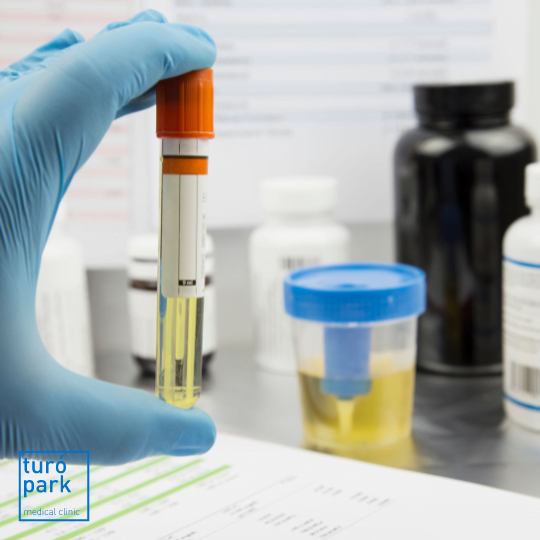What is "hot pee" testing?
In the event of unprotected sexual intercourse, and even in the absence of symptoms, it is recommended to carry out a screening test.
Gonorrhoea is tested by taking a sample of urine or secretions from the vagina, cervix, urethra, anus or throat. If you are diagnosed with gonorrhoea, screening for other sexually transmitted infections (STIs) is recommended, especially for Chlamydia.
If you would like to be screened completely anonymously, you can make an appointment at one of our partner laboratories by choosing the option that suits you below:
Gonorrhoea screening and treatment in Barcelona
Gonorrhoea is the most common sexually transmitted infection (STI) after chlamydia. It has been on the increase throughout Europe since the late 1990s, as have most STIs.
If you have symptoms suggestive of gonorrhoea or have had risky sex, don't wait to get tested. Treatment is available to avoid long-term health consequences.

→ Book the STD test best suited to your needs
We have different types of tests available depending on the analysis you want to perform. Choose the one that best suits your needs.
What is gonorrhoea?
Also known as gonorrhoea or "hot piss", gonorrhoea is a sexually transmitted infection caused by the bacterium Neisseria gonorrhoeae. It has been on the increase in recent years in France and mainly affects men under the age of 30.
Gonorrhoea: symptoms
Symptoms of gonorrhoea usually appear 2-5 days after infection in men, but women may not experience any symptoms of the disease.
The most common signs of gonorrhoea include
- Abnormal discharge from the penis or anus
- Tingling or burning while urinating
- Pain in the testicles or anus area
- Abnormal vaginal discharge
- Vaginal bleeding after sex and between periods
- Sore throat
- Stomach ache
A man with these signs should talk to his partner, as she may not show any signs, even if she is a carrier of the bacteria.

What should I do if I test positive?
If your STD test is positive, you can consult one of our English-speaking doctors at Turó Park Clinics. He or she will explain the results and guide you through the various treatment options available to you.
If you are HIV-positive, a combination of lifelong treatments (triple therapy) can be considered to stop the progression of the disease. However, it is not yet possible to completely eliminate the virus.
To treat syphilis, antibiotics are usually prescribed and the prognosis for recovery is very good. The patient's sexual partners must also be treated.
Antibiotics are the most common treatment for trichomonas vaginitis, gonorrhoea, lymphogranulomatosis venereum and mycoplasma infections.
Genital herpes cannot be completely eliminated. However, treatment can relieve the pain and limit the duration and intensity of the herpes if it recurs.
Finally, in the majority of cases, hepatitis B heals spontaneously, but in some cases it can become chronic.

Quality care network
How is gonorrhoea transmitted?
"Hot piss" is a sexually transmitted infection. It is possible to become infected through :
- Oral sex
- Vaginal sex
- Anal sex
- Contact between the genitals of partners without penetration
- Sharing sex toys
An infected mother can also pass gonorrhoea to her baby at the time of delivery.
What are the possible complications of gonorrhoea?
If left undiagnosed and untreated, gonorrhoea infection can progress to complicated forms.
In men, untreated gonorrhoea can cause inflammation of the prostate or epididymis, which can lead to infertility.
In women, untreated gonorrhoea can lead to chronic abdominal pain and inflammation of the uterus and fallopian tubes, resulting in infertility or ectopic pregnancy.
Infection in newborns can lead to eye infection and blindness.
Gonorrhoea: treatment
If the diagnosis is confirmed, treatment with antibiotics is initiated. Ceftriaxone is usually used as an intramuscular or intravenous injection. Treatment for chlamydia is frequently offered in addition, as the two infections are often associated.
A follow-up visit is recommended one week after treatment. It is also important to abstain from unprotected sexual intercourse for one week after a single dose of treatment or for the duration of the treatment if it is longer.
How can gonorrhoea be prevented?
As with all sexually transmitted infections, the prevention of gonorrhoea is based on the systematic use of condoms, including during foreplay and oral sex. It is also important to wash your hands well after using the toilet.
Gonorrhoea : FAQ